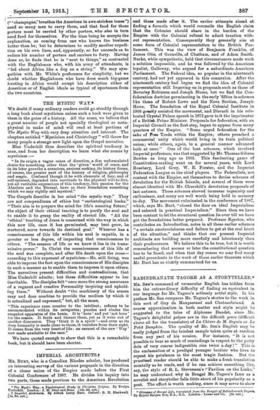IMPERIAL ARC HITECTS.f
Ma. BURT, who is a Canadian Rhodes scholar, has produced an interesting survey-of the various proposals in the direction of a closer union of the Empire made before the First Colonial Conference of 1887. He divides his inquiry into two parts, those made previous to the American Revolution • The Mystic Way • isPsychologic• at Study in Christian Origins. By Evelyn tnderhil1. London: J. M. Dent mid Sons. 1I2s. 6d. net.) t tensorial Architects. By Alfred Leroy Burt. Oxford: B. H. Blackwell. [Se. ad. net.] and those made after it. The earlier attempts aimed at finding a formula which would reconoile the English claim that the Colonies should share in the burden of the Empire with the Colonial refusal to admit taxation with- out representation. Consequently they generally aim at some form of Colonial representation to the British Par- liament. This was the view of Benjamin Franklin, of James Otis, of Grenville, of Chatham, and of Adam Smith. Burke, while sympathetic, held that circumstances made such a solution impossible, and he was followed by the American loyalist, Galloway, who argued for a subordinate American Parliament. The Federal idea, so popular in the nineteenth century, had not yet appeared in this connexion. After the nineteenth century had begun we find the idea of Colonial representation still lingering on in proposals such as those of Beverley Robinson and Joseph Hume, but we find the Con- federation doctrine germinating in the early 'fifties in schemes like those of Robert Lowe and the Nova Scotian, Joseph Howe. The foundation of the Royal Colonial Institute in 1868 greatly assisted the movement, and Disraeli in his cele- brated Crystal Palace speech in 1872 gave to it the imprimatur of a British Prime Minister. Proposals for federation, with an Imperial Council as the first step, began to appear from many quarters of the Empire. "Some urged federation for the sake of Free Trade within the Empire; others preached a commeroial unity which would bring in its train political union; while others, again, in a general manner advanced both at once." One of the beat schemes, which involved Imperial preference, was that suggested by Mr. Thomas Gibson Bowles as long ago as 1885. This fascinating game of Constitution-making went on for several years, with Lord Rosebery, Lord Grey, W. E. Forster, and the Imperial Federation League as the chief players. The Federalists, not content with the Empire, set themselves to devise schemes of devolution for the British Islands, and several of them were almost identical with Mr. Churchill's devolution proposals of last autumn. These schemes showed immense ingenuity and enthusiasm, and many are well worth being held in memory to-day. The movement culminated in the conference of 1887, which, says Mr. Burt, "closed the door on ideal Imperialism and ushered in practical Imperialism." Since then we have been content to let the structural question lie over till we have got the foundations better prepared. Professor Egerton, who contributes an Introduction, notes in all these earlier schemes "a certain amateurishness and failure to get at the real heart of the situation," and thinks that our present Imperial architects are building more carefully and laboriously than their predecessors. We believe this to be true, but it is worth remembering that sooner or later the constitutional question has to be faced, and when that day comes we may find many useful precedents in the work of those earlier theorists which Mr. Burt has so clearly summarized for us.










































 Previous page
Previous page